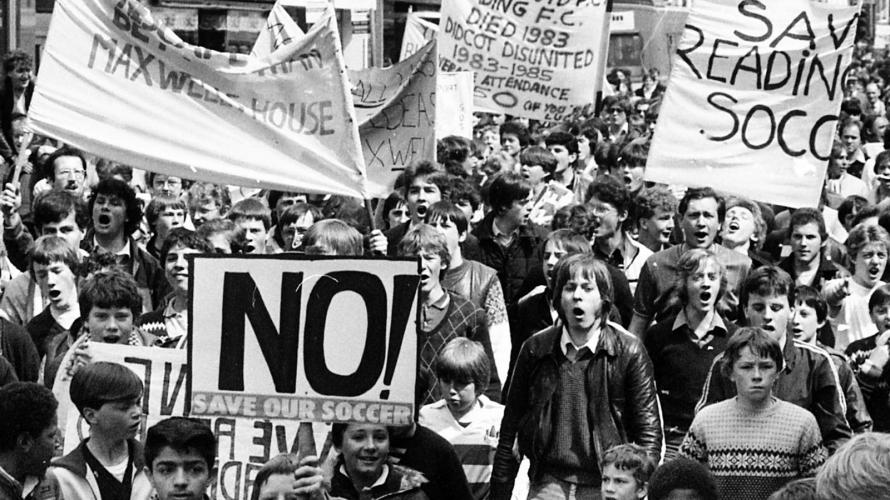In the spring of 1983 media mogul and occasional football chairman Robert Maxwell announced a daring plan which, if it had gone ahead, would have changed the football landscape forever while depriving two sets of fans of watching the clubs they had grown-up supporting all of their lives.
That April without any prior warning and to everyone’s amazement Maxwell, the then owner of Oxford United, told the BBC that he was on the verge of taking a controlling interest in nearby Reading, prior to merging the two clubs and creating a new superclub which would go by the name of the Thames Valley Royals.
At the time Maxwell was something of a saviour among United’s fans having bought them in 1982, saving them from almost certain bankruptcy as a result; but the club was far from secure and still found themselves haemorrhaging money at a time when gates were low and football was far from the well-oiled money-making machine that it is today.
Meanwhile, some 25 miles down the A34 Reading also found themselves struggling in the old Third Division playing in front of just a couple of thousand people each week and to a businessman such as Robert Maxwell there seemed only one feasible option.
The thing was, Maxwell wasn’t a football person. He was a businessman who enjoyed the adulation that being involved in the game brought with it and he saw a simple solution to the predicament: there are two clubs struggling within a 30 minute drive of each other, why not merge them?
The problem with this plan was, Maxwell hadn’t even thought to discuss his big idea with the then Oxford United boss Jim Smith, so when news broke of the proposed merger, panic set in and questions were soon being asked. "Your first thought is, 'Am I going to have a job?'," Smith later told the BBC on remembering his emotions at the time. "But that was soon guaranteed by Mr Maxwell. Then all hell broke loose."
But assurances to the manager did nothing to ease the tension among the players who now faced the prospect of not just fighting for a first-team place among a squad of 24 players, more like a playing roster of 40 plus professionals.
“I had a hard enough job getting into the team as it was,” recalls former United midfielder Mark Wood. “Now there was going to be another squad of players but Jim Smith then went on to say: 'We're only doing it so we can buy Reading striker Kerry Dixon. All your places are safe."
Just a week after Maxwell's earth-shattering announcement, Oxford fans organised a mass protest at the club’s Manor Ground prior to the home game against Wigan Athletic as thousands delayed kick off for over 30 minutes by staging a sit-down protest in the centre circle.
Adamant his plan would go ahead Maxwell looked on from the director’s box safely out of reach of the fans’ anger but not out of earshot and on a BBC radio phone-in a week later he made his feelings clear about the unhappy supporters. "If they want to become supporters of someone else, they're entirely welcome," he said. "If the deal does not go through, both Reading and Oxford will be dead before the beginning of next season.”
Fortunately for both sets of fans the Thames Valley Royals never did materialise, but not due to supporter protests or a lack of willingness from both parties; rather a technicality which prevented the official merger of both clubs when eagle-eyed local businessman and former Reading player Roger Smee, who was vehemently against the merger, spotted a discrepancy in the club’s books.
He noticed that Reading had issued shares the previous year that had been authorised in annual general meetings but were yet to be issued, meaning the Reading board effectively had no majority and were unable to legally approve a takeover from Oxford United or anyone else for that matter.
"I was probably the only person in the world who at that point thought: 'That's unusual. A year ago they didn't have a majority, so how on earth have they issued these shares to themselves while Reading was a public company?’” he told the BBC “’That would be against the law.'"
Reading Chairman Frank Waller was promptly handed a High Court injunction forbidding the sale of the unissued shares and on the 22nd of April, as the two parties met to announce the official merger they were told of the news that the deal could no longer go ahead, leading to red faces all round.
Calling the matter merely a “side show” Maxwell attempted to push the deal through regardless, making his own private offer to Reading shareholders, but the deal was declined and as a result Waller, along with club directors Leslie Davies and John Briggs were left with no option but to quit the club as Reading and Oxford survived to fight another day as two proud football clubs; representing two separate communities with their own identities who, to this day, remain fierce local rivals.
